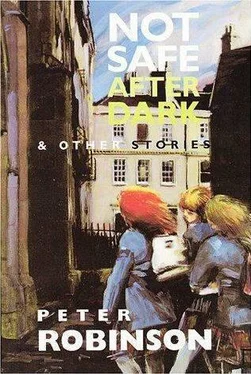When Frank walkedthrough to the kitchen, glass crunched under his feet, and he sent knives, forks and spoons skittering across the linoleum. He turned on the light. Someone had broken in while he had been at the Legion. They had cut the wire screen and smashed the glass in the kitchen door. They must have emptied the drawers looking for silverware because the cutlery was all over the place.
Someone had also been in the front room. Whoever it was had knocked or pushed over the tailor’s dummy and the little table beside his armchair where he kept his reading glasses, book and coffee mug.
Suddenly afraid in case they were still in the house, Frank climbed on a stool to reach the high cupboard above the sink. There, at the back, where nobody would look beyond Joan’s unused baking dishes, cake tins and cookie cutters shaped like hearts and lions, lay his old service revolver wrapped in an oily cloth. He had smuggled it back from the war and kept it all these years. Kept it loaded, too.
With the gun in his hand, he felt safer as he checked the rest of the house. Slowly, with all the lights on, he climbed the stairs. They had broken the padlock on Joan’s room. Heart thumping, he turned on the light. When he saw the mess, he slumped against the wall.
They had emptied out all her dresser drawers, scattering underwear and trinkets all over the shiny pink coverlet on the bed. And it looked as if someone had swept off the lotions and perfumes from the dressing table right onto the floor. One of the caps must have come loose because he could smell Joan’s sharp, musky perfume.
The lacquered jewellery case, the one he had bought her in New York with the ballet dancer that spun to the ‘Dance of the Sugar-Plum Fairy’ when you opened it, lay silent and empty on the bed. Frank sat down, gun hanging between his legs. They’d taken all Joan’s jewellery. Why? The stuff obviously wasn’t valuable. Just trinkets, really. None of it could possibly be worth anything to them. They had even taken her wedding ring.
Frank remembered the day he bought it all those years ago: the fairground across the street from the small jeweller’s; the air filled with the smells of candyfloss and fried onions and the sounds of children laughing and squealing with delight. A little girl in a white frock with pink smocking had smiled at him as she passed by, one arm hugging a huge teddy bear and the other hand holding her mother’s. How light his heart had been. Inside, the ring was inscribed, ‘FRANK AND JOAN. 21 JULY 1946. NO GREATER LOVE.’ The bastards. It could mean nothing to them.
Listlessly, he checked his own room. Drawers pulled out, socks and underwear scattered on the bedclothes. Nothing worth stealing except the spare change he kept on his bedside table. Sure enough, it was gone, the $3.37 he had piled neatly into columns of quarters, dimes, nickels and pennies last night.
They didn’t seem to have got far in the spare room, where he kept his war mementos. Maybe they got disturbed, scared by a sound, before they could open the lock on the cabinet. Anyway, everything was intact: his medals; the antique silver cigarette lighter that had never let him down; the bayonet; the Nazi armband; the tattered edition of Mein Kampf ; the German dagger with the mother-of-pearl swastika inlaid in its handle.
Frank went downstairs and considered what to do. He knew he should put the gun back in its hiding place and call the police. But that would mean intrusion, questions. He valued his privacy and he knew that the neighbours thought he was a bit of an oddball. What would the police think of him, a man who kept the torso of a tailor’s dummy in his living-room, along with yards of moth-eaten material and tissue-paper patterns? What if they found his gun?
No, he couldn’t call the police; he couldn’t have them trampling all over his house. They never caught burglars, anyway; everyone knew that. Weary, and still a little frightened, Frank nailed a piece of plywood over the broken glass, then carried his gun upstairs with him to bed.
•
The following morning was one of those light, airy days of early June, the kind that brings the whole city to the Beaches. The sky was robin’s-egg blue, the sun shone like a pale yolk, and a light breeze blew off the lake to keep the temperature comfortable. In the gardens, apple and cherry blossom clung to the trees and the tulips were still in full bloom. It was a day for sprinklers, swimsuits, barbecues, bicycle rides, volleyball and lawn sales.
Normally, Frank would have gone down to the boardwalk, about the only exercise he got these days. Today, however, a change had come over him; a shadow had crept into his life and chilled him to the bone, despite the fine weather. He felt a deep lassitude and malaise. So much so that he delayed getting out of bed.
Maybe it was the dream made him feel that way. Though perhaps it wasn’t right to call it a dream when it was so close to something that had really happened. It recurred every few months, and he had come to accept it now, much as one accepts the chronic pain of an old wound, as a kind of cross to bear.
Separated from his unit once in rural France during the Second World War, he had dragged himself out of a muddy stream, cigarettes tied up safely in army-issue condoms to keep them dry, and entered a forest. A few yards in, he had come face to face with a young German soldier, who looked as if he had also probably lost his comrades. They stared open-mouthed at each other for the split second before Frank, operating purely on survival instinct, aimed his revolver first and fired. The boy simply looked surprised and disappointed at the red patch that spread over his chest, then his face emptied of all expression for ever. Light-headed and numb, Frank moved on, looking for his unit.
It wasn’t the first German he had killed, but it was the first he had looked in the eye. The incident haunted him all the way back to his unit, but a few hours later he had convinced himself that he had done the right thing and put it behind him.
After the war the memory surfaced from time to time in dreams. Details changed, of course. Each time the soldier had a different face, for example. Once, Frank even reached forward and put his finger into the bullet hole. The soft, warm flesh felt like half-set jelly. He was sure he had never touched it in real life.
Another time, the boy spoke to him. He spoke in English and Frank couldn’t remember what he said, though he was sure it was a poem, and the words ‘I knew you in this dark’ stuck in his mind. But Frank knew nothing of poetry.
This time the bullet had gone straight through, leaving a clean circle the size of a ring, and Frank had seen a winter landscape, all flat white and grey, through the hole.
He still had the gun he had used that day. It was the same one he had got down from the high cupboard last night when he thought the burglars might still be in the house. It was the one he felt for now under the pillow beside him.
•
Had he got up that day? He couldn’t remember. He sat propped against pillows on his bed that night watching television as usual. He felt agitated, and whatever the figures on the screen were doing or saying didn’t register. For some reason, he couldn’t get the wedding ring out of his mind, the senselessness of its theft and the unimaginable value it had for him. He hadn’t realized it fully until the ring was gone.
Then he thought he heard some noise outside. He turned the sound off with the remote and listened. Sure enough, he could hear voices. Beyond his back garden was a narrow alleyway, then came the backs of the stores and low-rise apartment buildings on Queen Street. Sometimes in this warm weather, when everyone had their windows open, you could hear arguments, television programmes and loud music. These were real voices, Frank could tell. Television voices sounded different. There were two of them, a woman’s and a man’s, hers getting louder.
Читать дальше










![Джеймс Чейз - Not Safe to Be Free [= The Case of the Strangled Starlet]](/books/417649/dzhejms-chejz-not-safe-to-be-free-the-case-of-the-thumb.webp)

